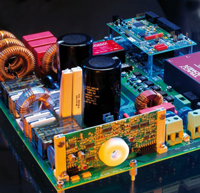
| Home | About Us | Contribute | Bookstore | Advertising | Subscribe for Free NOW! |
| News Archive | Features | Events | Recruitment | Directory |
CMP PROCESSING
Learn more about R&D chemical mechanical polishing by requesting our FREE informational CD.
| FREE subscription |
| Subscribe for free to receive each issue of Semiconductor Today magazine and weekly news brief. |
News
18 January 2008
Fraunhofer ISE sets PV inverter efficiency record
Fraunhofer Institute for Solar Energy Systems ISE in Freiburg, Germany says that it has achieved a maximum DC-AC conversion efficiency rating of 98.5% for photovoltaic (PV) inverters in a test using prototype silicon carbide-based MOSFETs manufactured by Cree Inc of Durham, NC, USA.
 These are the highest efficiency results reported for photovoltaic inverters to date, Fraunhofer ISE claims, as well as representing the first test of SiC MOSFETs for this application. The researchers also reduced the inverter’s power dissipation by 30-50% compared with results obtained using traditional silicon-based transistors.
These are the highest efficiency results reported for photovoltaic inverters to date, Fraunhofer ISE claims, as well as representing the first test of SiC MOSFETs for this application. The researchers also reduced the inverter’s power dissipation by 30-50% compared with results obtained using traditional silicon-based transistors.
Picture: Inverter circuit board with SiC components. (Copyright: Fraunhofer ISE.)
“Silicon carbide components switch faster and have a smaller forward bias power loss than traditional silicon-based transistors,” says Dr Bruno Burger, head of the Power Electronics Group at Fraunhofer ISE.
Inverters transform direct current generated by PV systems into alternating current and feed it into the public power grid. The higher the efficiency rating of the inverter, the greater is the energy yield of the entire PV system. To achieve the highest energy output over time, the efficiency rating should remain high over a wide range of power levels. During testing, the inverter with Cree SiC components also set a new performance precedent across a wide range of power output values.
“Our work involved characterizing the components and integrating them into existing inverters,” adds Burger. “If, in a further step, the inverter circuitry is optimized specifically for silicon carbide, then even greater efficiencies could certainly be achieved.”
The Fraunhofer team achieved the efficiency rating record with a single-phase inverter with their patent-pending HERIC topology and a nominal power rating of 5kW. The researchers also increased the efficiency rating of a three-phase inverter with a nominal power rating of 7kW from 95.1% to 97.5%.
See related item:
SiC electronics market to reach $800m by 2015
Visit: www.ise.fhg.de
